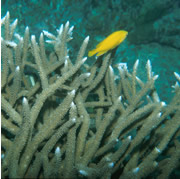The rising temperatures of the sea water cause the expansion of the habitat of coral from the Caribbean

Global warming may have positive effects. There are corals that thrive, according to the annual meeting of the Geological Society of America in Seattle, Washington. At least one species of coral from the Caribbean, Acropora, has taken advantage of the warm temperatures to spread northward, as it has done in the past. So say William Pratchett of PBS&J, an environmental planning firm located in Miami, Florida, and Richard Aronson of the Dauphin Island Marine Laboratory in Alabama. In 1998 live specimens of the coral were found near Fort Lauderdale, Florida, and in 2002 in the northern Gulf of Mexico near the coast of Texas. Similar northward expansions have been observed in corals in the Pacific Ocean. "The ray of light, which sticks out through the clouds, is the fact that there are corals, which do not face extinction and may even spread." Pratchett said at the meeting. The effect of global warming on plants and animals in the high and middle latitudes is well documented. In these latitudes the increases in temperatures were the most significant, and deviations occurred in the living areas towards the north. There were also changes in the migration and flowering times. Much less is known about the responses of tropical species. For corals, most of the news was bad. Warmer water is considered to accelerate the development of diseases and causes bleaching - the release of algae, which is necessary for the survival of corals. It may not be wise to be rash and classify the Acropora with the winners of global warming, argues geologist Dennis Hebard of Oberlin College in Ohio. It is likely that the coral population will increase with global warming, but only if the water temperature remains below the coral's upper limit of 320 C. Most models predict that the temperatures will not break this threshold, but this is no more than our best guess, warns the hail. In addition, today's corals must deal with other human impacts such as pollution, which raises the possibility that they will be more vulnerable at temperatures close to the upper limit. "We threw an unknown factor, created by man, into the ecosystem. Coral reefs have not had to deal with this before.” says the hail.
Pratchett and Aronson made their first sighting while working to repair a coral reef near Fort Lauderdale that had been badly damaged by an American submarine. They noticed that the submarine had exposed a fossilized reef. The ancient coral was Acropora, whose current habitat extends about fifty kilometers south of the Fort Lauderdale area, near Miami. With the help of radioactive carbon dating, the researchers found that the corals were 7000 years old. In the period about 4000 to 9000 years ago the temperatures of the Atlantic Ocean were warm by about 2 to 4 degrees. "Thousands of years ago there was a fertile reef ten meters thick, which stretched fifty kilometers north of its current habitat," says Pratchett. Since then he has found additional ancient reefs far off the coast of Florida, extending as far as the shores of Palm Beach, 150 km north of the current location of the reef.
